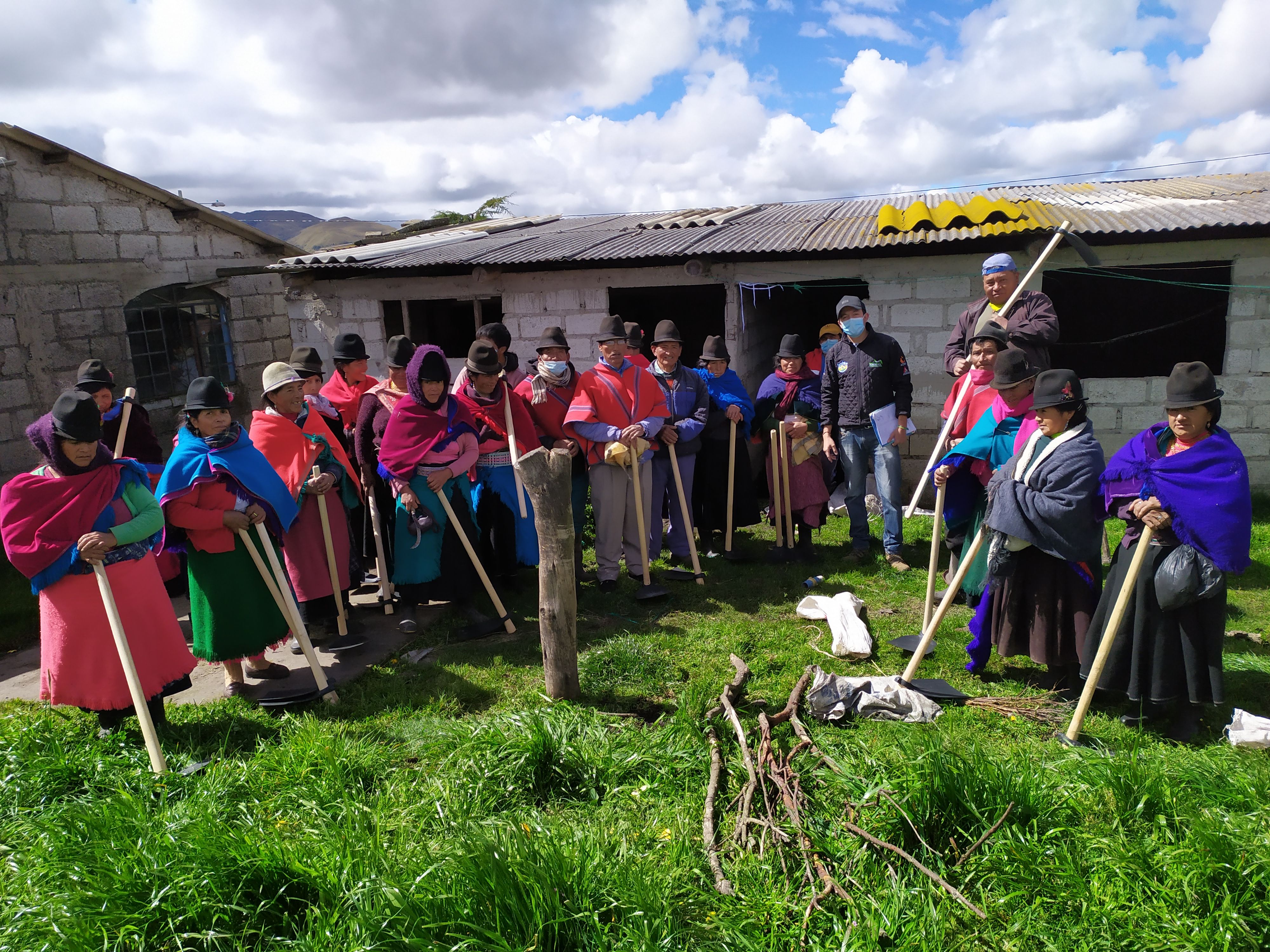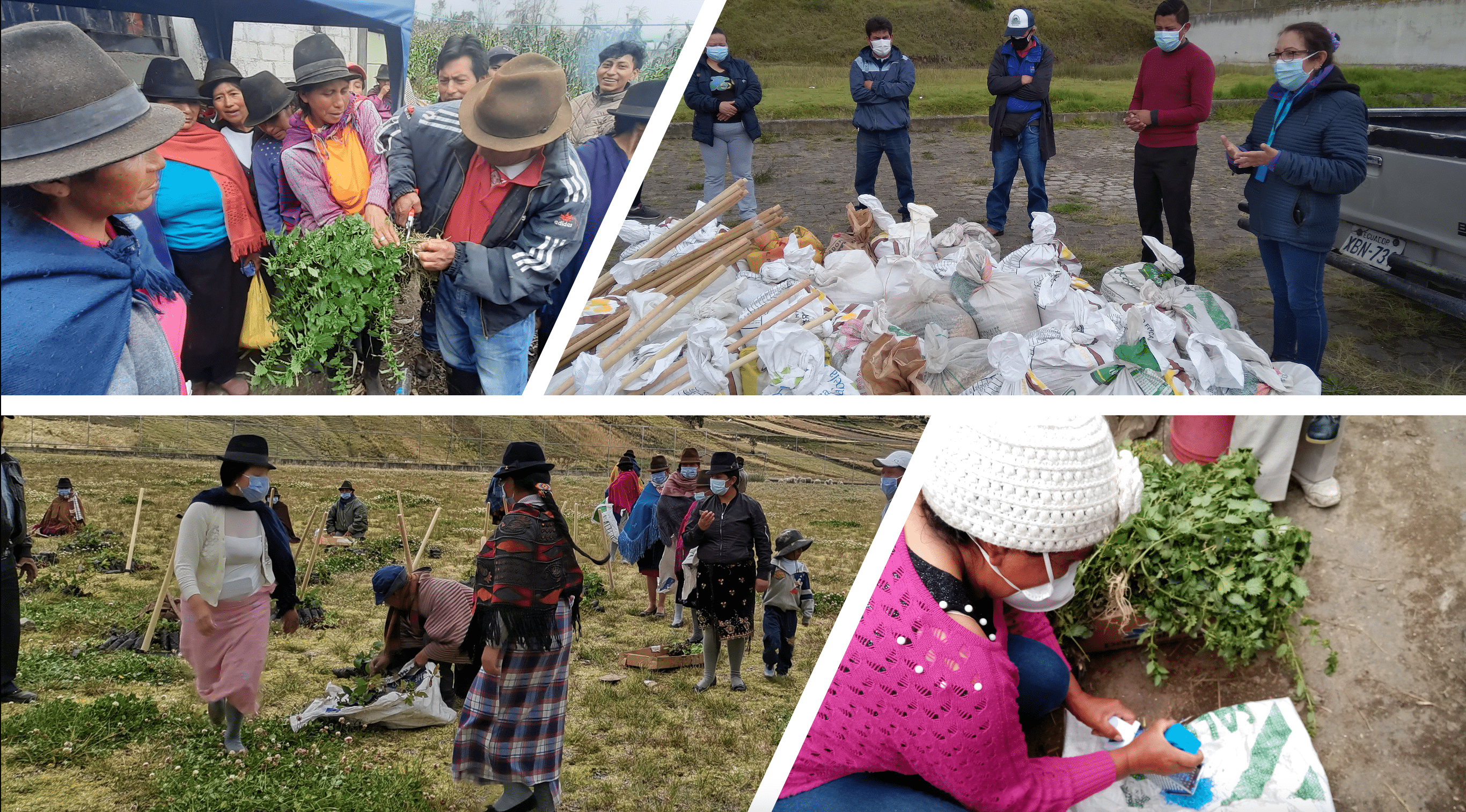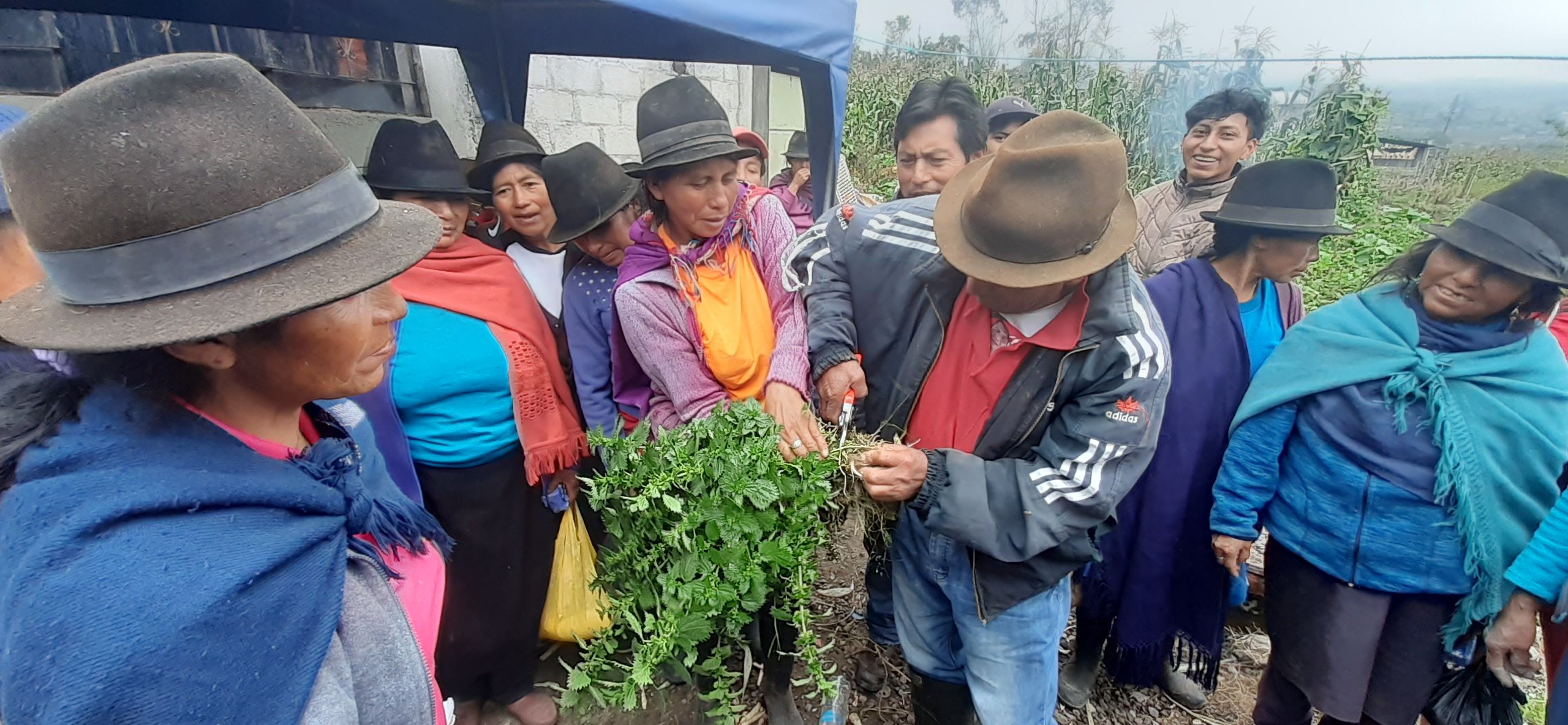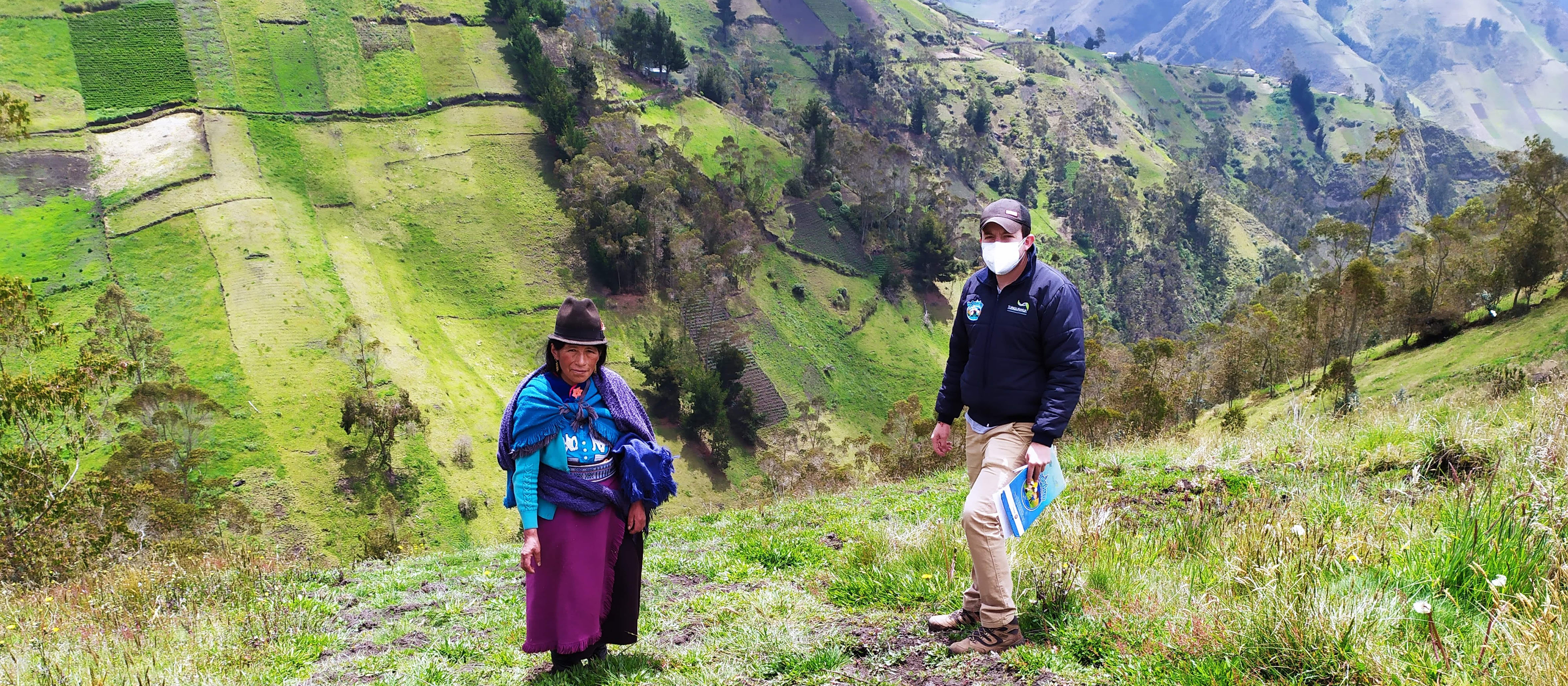Ecuador, 3 March 2022 - The project "Andean Resilience: strengthening small-scale agricultural production in areas vulnerable to climate change in the highlands of Ecuador and Peru"
, funded by the EUROCLIMA+ programme in the Resilient Food Production sector, has been successfully completed. A virtual event brings together representatives of the institutions that have jointly designed and implemented the project to report on achievements and results.
"From EUROCLIMA we are convinced that the project intervention has been very relevant for promoting resilient agriculture, also for the livelihoods of small producers and access to nutritious food in areas where it is necessary to control the agricultural frontier and conserve the paramo ecosystem," said Claudia Cordero, Regional Advisor of the EUROCLIMA+ Programme, who closed the final event presenting the main results achieved.
Watch the video of the closing of the project
The event
The event was attended by representatives of the institutions that have jointly designed and implemented the project: the ACRA Foundation as the main executor and the partners and allies in Ecuador and Peru: the provincial governments of Cotopaxi, Tungurahua and Cañar, the Páramos Tungurahua Fund, the Regional Government of Piura, the regional fund for Water FORASAN - Piura and the Chira Piura Watershed Water Resources Council.
During the event, the main activities and achievements of the project in its four components were presented by Marco Ferrari, Martha Pacheco and Mariana Duque, from ACRA's technical team, Carlos Calle from FORASAN Piura, and Miguel Acosta from the Pontificia Universidad Católica of Ecuador, ACRA's partner in the academic training component.
The importance of the focus on agroecology and environmental conservation in working with farmers to strengthen the resilience of family farming production chains, and the application of a gender and climate change approach in the design of local development strategies and plans were highlighted.
The cooperation with FORASAN in Piura in support of farmers in the highlands of the region was also highlighted, and finally, the process of creating and carrying out the academic course on opportunities for the implementation of the NDCs, in coordination with the Catholic University, was indicated
 |
Province of Tungurahua, Ecuador
The Andean Resilience project
The project, which had a total amount of €1,054,314 (EU grant €843,435), was carried out in three provinces of the Ecuadorian highlands, Tungurahua, Cotopaxi and Cañar, and in the highlands of the Piura region in Peru. A common feature of these territories is that they have large areas of paramo, an ecosystem of fundamental importance as a source of water and rich in biodiversity, but threatened by severe environmental degradation, the effects of climate change and the advance of the agricultural frontier.
In this environment, the project has aimed to improve the resilience to climate change of small-scale production systems and value chains and family farming, ensuring the control of the agricultural frontier and the conservation of the paramo. The expected results were achieved in four areas: Agro-ecological production: best agricultural practices, Local Climate Change Plans with a gender focus, Implementation of replicable financial models, Systematisation of information, dissemination and replication of best practices
In a scenario of a changing climate, with projections of rising global temperatures and adverse local effects in terms of water availability, small-scale farming activities, carried out at the family level and with scarce economic resources, are those that are most at risk, with negative impacts on the food security of rural farmer communities, mostly indigenous peoples, who live within the paramo ecosystem.
Conservation of the Paramo
The design of the Project has been based on the strategy of creating a favourable context for the conservation of the paramo, through a principle of solidarity, co-responsibility and reciprocity with the people who live in the ecosystem. In this regard, the improvement of the living conditions of the indigenous and farming communities is the main driving force of the action, and this approach allows the generation of consensual and shared conservation actions among the various actors with social, economic and environmental co-benefits.
The project has implemented several measures to strengthen agricultural activities in the lowland areas of the paramo and adapt them to climate change, reducing the impact of adverse climatic phenomena and therefore the vulnerability of the communities. At the same time, this strategy allows controlling the advance of the agricultural frontier, helping in the conservation of the paramo ecosystem.
The project has worked together with the producers in the chains of family farming, fruit and vegetable production, milk production, guinea pig and trout breeding. The main activities in this component of the project include: soil improvement, diversification of family gardens, implementation of silvopastoral systems, improvement of food and health in the rearing of small species, use of agricultural wastes, implementation of sustainable water management techniques, support to marketing activities, and protection of water sources in the highlands. The agro-ecological approach, the exchange and rescue of traditional knowledge of producers and communities, and respect for the environment are applied.
With this approach, 2,132 small producers (mostly women) and their families in Ecuador and Peru have worked together, and around 200 training workshops have been held. At the same time, inputs, materials and infrastructure have been provided for the practical application of adaptation measures on the farm and to strengthen associative marketing processes.
In addition to training, spontaneous adaptation and mitigation measures are identified in order to reinforce or adjust them, identifying threats, impacts and strategies for present and future responses to the effects of climate change in a participatory manner.
 |
Local Plans for Climate Change with a Gender Approach
This work has led to an assessment of the climate vulnerability of small producers' associations and to the generation of 6 local plans for adaptation to climate change with a gender perspective for these associations. The documents have been constructed from a social and gender perspective, with cultural and economic relevance of the producers themselves, evaluating the behaviour of precipitation, temperature and vulnerability of the two sectors, in order to understand the risk from climate change of the two associations, crop production and livestock activities. Gender gaps, differentiated participation and measures to achieve gender equality in the different groups have been identified. Finally, gender-sensitive measures and best practices for adaptation to climate change have been defined for agriculture and livestock activities.
Finally, these local plans have been validated with the relevant local governments for funding and implementation. In this way, it will be possible to continue adaptation actions after the end of the project, thanks to the collaboration with local actors.
A fundamental component of this process has been the strengthening of human and institutional capacities to face the challenges of climate change, through the training and involvement of people and professionals trained on climate change in local management bodies, both public and civil society.
The methodology used as a reference for the implementation of the local plans is based on that proposed by the German Agency for International Cooperation, GIZ, and adapted by the Tropical Agricultural Research and Higher Education Centre, CATIE, in its programme on mainstreaming adaptation in development planning.
In this regard, participatory tools designed under the principles of andragogy and popular adult education were used to analyse the Associations' agricultural production systems from their perspective and including the components of gender analysis: awareness raising, farmers' gender roles, use of time, access to and control of resources and benefits.
Counting on the valuable alliance with financial mechanisms such as the Tungurahua Paramos Fund and the Piura Regional Water Fund, the project has worked on the inclusion of the climate change component and gender approach in the strategies for these funds, so that the adaptation and mitigation actions identified in the adaptation plans continue to have a local source of financing. In particular, a proposal has been generated to incorporate adaptation to climate change in the Management Plans of the Fund for the Protection of Paramos and the Fight against Poverty of the Province of Tungurahua, Ecuador, and it has contributed to the definition of the Strategic Plan of the Piura Regional Water Fund.
The management model that the project contributes to strengthening, i.e. the creation of local adaptation plans with a gender perspective and its financing through local financial mechanisms, is considered to be a model with good possibilities for scaling up and replication and has therefore been presented as a green solution at regional events, thanks to the EUROCLIMA+ spaces for dissemination.
 |
Diversification of family gardens, Tungurahua
Training at different levels
Training at different levels has been a transversal axis of work throughout the Project, involving producers, community leaders, local and national governments and representatives of the Water Funds. An important result in this component is the creation of the recurrent continuous training course in collaboration with the Pontifical Catholic University of Ecuador "Climate change, opportunities for the implementation of the Nationally Determined Contributions in the agricultural sector of South America", currently underway and with the participation of 50 representatives of institutions working towards the implementation of the NDCs in Ecuador, Peru, Colombia and Bolivia.
Virtual platforms have been very important for maintaining the development of dissemination and distance training activities during the most critical moments of the COVID19 pandemic. An important example has been the development of the cycle of 4 seminars held jointly with partners in Peru on "Training on Climate Change and Synergies between Adaptation and Mitigation in Agricultural Systems". Through virtual platforms it has also been possible to create and carry out the Provincial Roundtable on Climate Change and Circular Economy in Tungurahua, with the holding of 4 events in 2021 and a programme already established for 2022.
Another key factor is the exchange: it has taken place between producers from the different provinces of Ecuador and with a delegation of tarwi producers from Bolivia.
About the project "Andean Resilience"
The project "Andean Resilience" whose main implementer is ACRA, is being developed in the Andean highlands of Cotopaxi, Tungurahua and Cañar (Ecuador) and in the region of Piura (Peru), areas that are highly vulnerable to climate change. The project prepared the EUROCLIMA+ Green Solution "The Fund for Paramos and the Fight against Poverty promotes the implementation of participatory, culturally and economically sustainable Management Plans in the Province of Tungurahua, Ecuador."
More information
Marco Ferrari, ACRA: This email address is being protected from spambots. You need JavaScript enabled to view it.
Resilient Food Production Sector, This email address is being protected from spambots. You need JavaScript enabled to view it.



